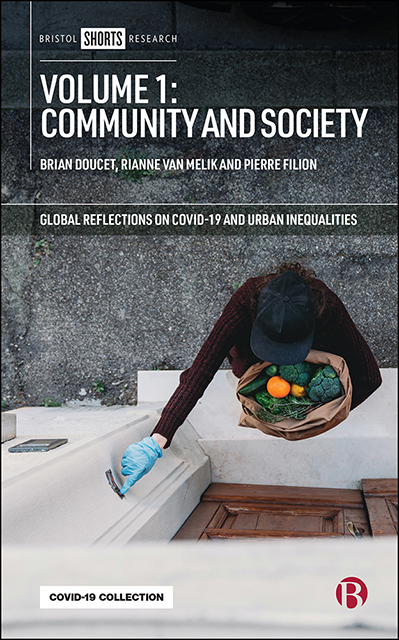Book contents
- Frontmatter
- Contents
- List of Figures and Tables
- Notes on Contributors
- Acknowledgments
- Preface to All Four Volumes of Global Reflections on COVID-19 and Urban Inequalities
- One Introduction
- Part I Working Practices
- Part II Life During Lockdown
- Part III Migration, Migrants, and Refugees
- Part IV Age, Race, Gender, and Ability
- Index
Twelve - The Impacts of Socio-Spatial Inequity: COVID-19 in São Paulo
Published online by Cambridge University Press: 13 April 2023
- Frontmatter
- Contents
- List of Figures and Tables
- Notes on Contributors
- Acknowledgments
- Preface to All Four Volumes of Global Reflections on COVID-19 and Urban Inequalities
- One Introduction
- Part I Working Practices
- Part II Life During Lockdown
- Part III Migration, Migrants, and Refugees
- Part IV Age, Race, Gender, and Ability
- Index
Summary
This chapter addresses the multidimensional impacts of the COVID-19 pandemic on the lives of citizens of one of the largest and most unequal metropolises in the world, São Paulo. It is widely recognized that Brazil's response to the COVID-19 pandemic has been more than flawed, with a disproportionate impact on poor and indigenous communities (Curtice, 2020; The Lancet, 2020). The virulent politicization of the pandemic set the powerful federal government, in the hands of a far-right populist, on a collision course with the interests of federal states and cities in Brazil. While the Brazilian president has repeatedly denied the gravity of the pandemic, states and cities struggled to impose partial lockdowns and to organize medical responses, in the face of contradictory policy being enacted in their distant capital, Brasilia. This chapter describes the structural circumstances that led São Paulo to become one of the cities worse affected by the virus, leading to the almost complete collapse of its public health system. While COVID-19 was initially perceived as the ‘great equalizer’, infecting all regardless of race or social class, it soon became apparent that marked socio-spatial inequity means the effects of the pandemic are felt differently by various socio-economic groups in the city (see Xavier, Volume 2).
In order to approach these differences from a multidimensional perspective, we give accounts of three lifestories under the pandemic that illustrate these issues. These short accounts outline the daily lives of three ‘Paulistanos’ (inhabitants of São Paulo) who must negotiate urban space and access citizens’ rights in radically diverse ways. These accounts address issues of class, race, gender, political ideology, and space. The short narratives are drawn from a small pool of semi-structured interviews with citizens representative of larger categories conducted for this chapter and provide the reader with input on the several ways COVID-19 has impacted the lives of citizens from individual perspectives that nevertheless illustrate collective struggles. The main methods utilized are life-stories and discourse analysis. We briefly describe their accounts, connect them to wider trends and challenges in the city, and reflect on the issues unveiled by the pandemic and ponder the meaning of socio-spatial inequality for citizens’ access to rights (for a similar approach, see Lindenberg et al, Chapter Nineteen).
Eliana S., the cleaner
Eliana is a short and stout White Brazilian woman who works as a cleaner for several middle-class households.
- Type
- Chapter
- Information
- Volume 1: Community and Society , pp. 129 - 140Publisher: Bristol University PressPrint publication year: 2021



